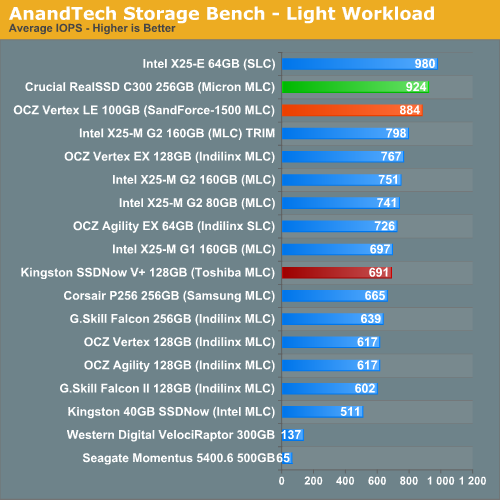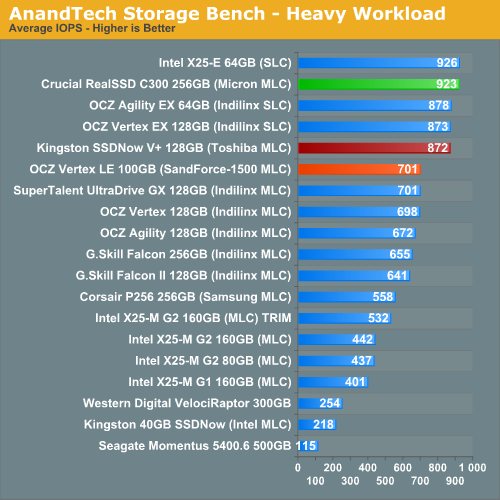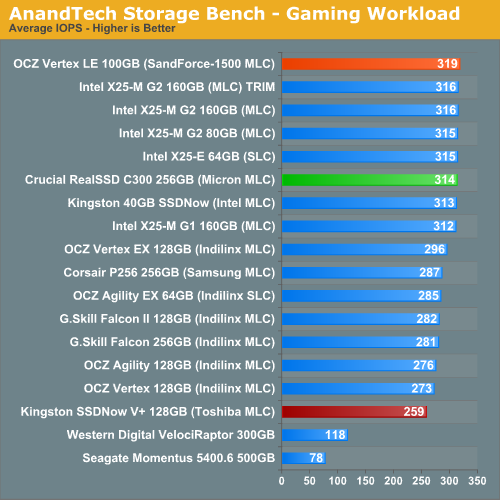OCZ’s Vertex Limited Edition Review & SSD State of the Union
by Anand Lal Shimpi on February 19, 2010 12:00 AM EST- Posted in
- Storage
AnandTech Storage Bench
Note that our 6Gbps controller driver isn't supported by our custom storage bench here, so the C300 results are only offered in 3Gbps mode.
The first in our benchmark suite is a light usage case. The Windows 7 system is loaded with Firefox, Office 2007 and Adobe Reader among other applications. With Firefox we browse web pages like Facebook, AnandTech, Digg and other sites. Outlook is also running and we use it to check emails, create and send a message with a PDF attachment. Adobe Reader is used to view some PDFs. Excel 2007 is used to create a spreadsheet, graphs and save the document. The same goes for Word 2007. We open and step through a presentation in PowerPoint 2007 received as an email attachment before saving it to the desktop. Finally we watch a bit of a Firefly episode in Windows Media Player 11.
There’s some level of multitasking going on here but it’s not unreasonable by any means. Generally the application tasks proceed linearly, with the exception of things like web browsing which may happen in between one of the other tasks.
The recording is played back on all of our drives here today. Remember that we’re isolating disk performance, all we’re doing is playing back every single disk access that happened in that ~5 minute period of usage. The light workload is composed of 37,501 reads and 20,268 writes. Over 30% of the IOs are 4KB, 11% are 16KB, 22% are 32KB and approximately 13% are 64KB in size. Less than 30% of the operations are absolutely sequential in nature. Average queue depth is 6.09 IOs.
The performance results are reported in average I/O Operations per Second (IOPS):

Under a typical, light poweruser workload, the Crucial RealSSD C300 bests OCZ's Vertex LE by 4.5% - not a tangible difference, just a (barely) measurable one. Intel's SLC X25-E is actually still the fastest thing here, which must be frustrating for Intel since the only thing separating the G2s from topping the charts is sequential write speed.
The Toshiba based Kingston drive performs similarly to the MLC based Indilinx drives, which is good since that's exactly where it's supposed to perform.
If there’s a light usage case there’s bound to be a heavy one. In this test we have Microsoft Security Essentials running in the background with real time virus scanning enabled. We also perform a quick scan in the middle of the test. Firefox, Outlook, Excel, Word and Powerpoint are all used the same as they were in the light test. We add Photoshop CS4 to the mix, opening a bunch of 12MP images, editing them, then saving them as highly compressed JPGs for web publishing. Windows 7’s picture viewer is used to view a bunch of pictures on the hard drive. We use 7-zip to create and extract .7z archives. Downloading is also prominently featured in our heavy test; we download large files from the Internet during portions of the benchmark, as well as use uTorrent to grab a couple of torrents. Some of the applications in use are installed during the benchmark, Windows updates are also installed. Towards the end of the test we launch World of Warcraft, play for a few minutes, then delete the folder. This test also takes into account all of the disk accesses that happen while the OS is booting.
The benchmark is 22 minutes long and it consists of 128,895 read operations and 72,411 write operations. Roughly 44% of all IOs were sequential. Approximately 30% of all accesses were 4KB in size, 12% were 16KB in size, 14% were 32KB and 20% were 64KB. Average queue depth was 3.59.

I ran and re-ran the tests - they're accurate. The Vertex LE does well, just not as good as the Kingston or Crucial drives here. The Crucial RealSSD C300 is simply a beast in our write-heavy test. I suspect that the fact that many of our writes here are compressed is to blame for the Vertex LE not being as fast as usual here. Remember that SandForce's architecture works by data reduction, whether through compression, deduplication or other similar natured algorithm. By definition those algorithms don't work well on data that is already being written in reduced form. If you're dealing with a lot of compressed archives, the Vertex LE will perform well, but not as well as the RealSSD C300.
Our final test focuses on actual gameplay in four 3D games: World of Warcraft, Batman: Arkham Asylum, FarCry 2 and Risen, in that order. The games are launched and played, altogether for a total of just under 30 minutes. The benchmark measures game load time, level load time, disk accesses from save games and normal data streaming during gameplay.
The gaming workload is made up of 75,206 read operations and only 4,592 write operations. Only 20% of the accesses are 4KB in size, nearly 40% are 64KB and 20% are 32KB. A whopping 69% of the IOs are sequential, meaning this is predominantly a sequential read benchmark. The average queue depth is 7.76 IOs.

Just as we saw with our PCMark tests, all of the drives perform about the same here. If you're just going to be tossing games on your SSD, you can't really go wrong with any of these drives. It's possible that if we were able to use our 6Gbps controller here that Crucial would break the mold as the drives here appear to be limited by sequential read speed.










83 Comments
View All Comments
neoflux - Sunday, February 21, 2010 - link
part number is K9HCG08U1M-PCB00, but still can't find a size in nm.neoflux - Monday, February 22, 2010 - link
Further research shows me that no one knows what manufacturing process size these actually are, which I find strange. No reviews include the information, there are no manufacturing spec sheets, etc. Only that they are lead-free and have 48 pins, haha.This all must makes me more curious. How does no one know?
eldiablopotato - Sunday, February 21, 2010 - link
Both the OCZ & Crucial SSDs are nice, since my motherboard can't do 6Gbps can anyone recommend which SSD to get? I'm thinking Crucial SSD, but then again I'm no expert on SSDs like Anand. :PFeedback welcomed.
nivek - Sunday, February 21, 2010 - link
OCZ says they can't get any more sandforce controllers at a low price point. But how does OWC get the same controller for their Mercury Extreme Enterprise SSD. OWC 100GB SSD is priced the same as OCZ Vertex LE 100GB!http://eshop.macsales.com/shop/internal_storage/Me...">http://eshop.macsales.com/shop/internal_storage/Me...
Per Hansson - Sunday, February 21, 2010 - link
Just curious about the missing capacitor, will there not be a big risk of dataloss incase of power outage?Do you know what design changes where done to get rid of the capacitor, where any additional components other than the capacitor removed?
Because it can be bought in low quantities for a quite ok retail price of £16.50 here;
http://www.tecategroup.com/ultracapacitors/product...">http://www.tecategroup.com/ultracapacitors/product...
sjobal - Sunday, February 21, 2010 - link
Hi Anand,I'm curious to know what SSD is most suitable for a mac. Since OSX does not support TRIM, some sort of garbage collection has to be done within the drive (firmware) or a software tool has to be available for OSX.
Is this something you'll look into in forthcoming reviews?
Best regards!
AnnonymousCoward - Saturday, February 20, 2010 - link
Anand,How can you benchmark in so many different ways, and yet end up with hardly any relevant information? All those PCMark graphs don't tell me squat. Your AnandTech Storage Bench is flawed, since (as your last article found) the SandForce uses compression and IOPS don't equal bandwidth! Why does the user care about IOPS?? Do they care about IOPS of their graphics cards? Or CPU?
With CPUs, you measure things like encoding time and game framerates. Things that matter!
This is the 3rd time I'm posting this. Refer to the last time: http://tinyurl.com/yjcr5vm">http://tinyurl.com/yjcr5vm
Zoomer - Sunday, February 21, 2010 - link
It's a waste of time to do what you're suggesting. The point of SSDs is to improve the user response time.Encoding time? It would likely be virtually identical due to the modern pre-fetching algorithms in place.
Game framerates won't really be affected since the average of 3 runs is taken. After the first run, most everything will be cached, either in hardware or in software by the os in mem.
In the real world, you would expect to see less dips in fps (min fps will be higher), assuming it is a fresh first run.
bradley - Sunday, February 21, 2010 - link
The point is germane. New SSD benchmarks are required to measure real world performance. Some of the current benchmarks end up limited to measuring nothing more than cache speed. IOPS is impractical and demonstrates nothing indicative regarding real world performance.the Problem with Write IOPS - in flash SSDs
http://www.storagesearch.com/problem-write-iops.ht...">http://www.storagesearch.com/problem-write-iops.ht...
erple2 - Sunday, February 21, 2010 - link
Ordinarily, I'd agree with you. However, the point of the article was to point out the problems with "older" benchmarks that would simply look at, in a vacuum, IOPS of a drive was inconsistent at best, and misleading at worst. In the case of Anand's testing methodologies, you see that the IOPS numbers he comes up with are, in fact, the "worst case scenario" listed for SSD's in the article you linked to.Until the giant Meltdown of SSD's in Anand's article (http://www.anandtech.com/storage/showdoc.aspx?i=35...">http://www.anandtech.com/storage/showdoc.aspx?i=35..., testing methodologies that benchmark reviewers were using were definitely perfectly suited to the problems with SSD's, namely the write-erase cycle being specifically excluded from the benchmarks. That indicated the main problem storagesearch.com referred to in the above linked article.
Anand has since changed his benchmark methodology for all SSD's to be a "polluted" SSD - he does not simply wipe the drive clean, then benchmark. He first fills the drive with data, then does a format (which does NOT wipe the drive clean - you still have the write-erase cycle to contend with), then runs benchmarks.
The other thing to look at is that the benchmarks that Anand looks at are, in fact, consistent. Saying that one drive attains 600 IOPS on "Anand's light StorageBench" where another attains 500 IOPS _ON THE SAME BENCHMARK_ does, in fact, give you a reasonably accurate comparison. The trouble you'll get into is if you state "Drive X gets 5000 IOPS, but Drive Y gets 9000 IOPS", not mentioning the actual benchmark used, or even worse, cherry-picking the benchmarks to favor the particular Drive. Then, you have to dig down and figured out whether the benchmarks that gave you "5000 IOPS" was, in fact, properly executed - is that really indicative of the performance of the drive, or only in a very tightly controlled environment to maximize performance numbers? However, that's a question you always have to look at regardless of what you're testing, be it video cards (3D Vantage doesn't give you an accurate picture of how well the card will perform in some particular scenario), CPU's (SPECint or SPECfp give you minimal information about how a CPU performs in a large database environment) or other devices.
So really, I think that the point the article in storagesearch is hammering at you should be wary of reading more into generic IOPS as a benchmark for these SSD's as is simply stated.
So, in conclusion, I disagree about 80% with what you have written.
(minor "edit"):
So I've re-read the GGP post - while it is true that IOPS as a number means nothing to me, it also winds up being true that posting a Bandwidth number would also be more or less worthless to me - what is important is the general ranking of these devices in the same benchmark. The benchmark is measuring the _relative_ performance of each of the drives in the same sequence of tests. Taking conclusions like "this drive gets 600 in a benchmark and that one gets 400 in another benchmark" ultimately fails.
(BTW, Anandtech staff, please fix the fact that I can't use any "rich" text in these posts)